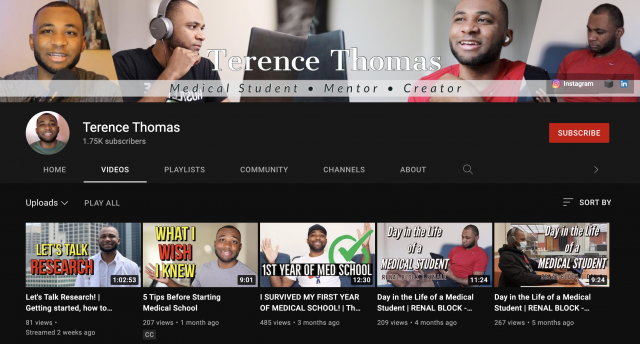
“You just have to rely on your own story,” Stony Brook alumnus Terence Thomas ‘18 says.
Now a second-year medical student at Sidney Kimmel Medical College, Thomas dedicates a large portion of his time mentoring pre-med students with an informative and personable YouTube channel.
Created by Thomas in 2019, his channel provides a unique account of his experiences and offers guidance to viewers with videos ranging from MCAT guidance to transparent discussions on the challenges of medical school to Day in the Life segments.
Thomas, who first attended the State University of New York College at Brockport had not always been on the pre-medical track. As a freshman, he majored in kinesiology and exercise science and was a college basketball player. After much contemplation and consideration, Thomas transferred to Stony Brook University in 2016 and became a man on a mission. His transition to a pre-medical student equipped him with a distinctive view of the process and helped garner a perspective that values authenticity.
Thomas had a chat with The Statesman to talk about his journey into applying to medical school, encouraging and guiding pre-meds with his YouTube channel, and looking forward to the long game.
The Statesman: What motivated you to start your YouTube channel and what unique perspective do you believe you bring to it?
Thomas: The motivation came behind just me wanting to help others primarily. Because of my success in the application cycle and because of how in the dark I felt throughout [the application cycle], I wanted the opportunity to just be transparent and tell people “hey, this is how I did it,” and just sharing my story with potential applicants.
I think when I started doing it, I didn’t understand how influential it could potentially be just to have somebody who is a minority in medicine giving a perspective that might not be seen as much [on YouTube]. So I took on that second passion in it, in sharing my story to be able to help inspire all applicants and minority applicants in particular.
What advice would you give some students who did not follow a traditional path, i.e. they don’t go into college wanting to be pre-med?
One of the toughest parts about changing your mind, so to speak, is looking at everybody else in your class who might be younger than you or on this path and you feel like you’re behind, and the biggest advice I can give is to run your race and realize that you are on your track.
If I didn’t have that mentality I definitely would have felt more discouraged. Transferring and delaying my application and taking a gap year, I think that embracing your journey and uniqueness helps give you an upper edge that you have real-world experience, to give you a more well-rounded persona in general that was very valuable for me. You just have to rely on your own story.
Can you talk about a particular mentorship or experience which validated your hard work?
Over time you get things here and there that maybe let you know you are doing a good job. One of the biggest things first was probably my first shadowing experience with an orthopedic surgeon in New York City; it was the first scenario where a doctor was motivating and encouraging and included me in the conversation. What also gave me support was my undergrad research experience. Being in that lab, and Dr. Vasudevan really encouraged me throughout my entire undergrad experience. Just being able to have somebody that relied on me and trusted me validated that I was capable and worthy of being a doctor, I think all those different things help validate that “Okay I think I can do this thing” and as you have more positive experiences it just helps over time.
You have a YouTube video called “How To Write an Authentic Medical School Personal Statement.” How do you advise students to begin crafting their story before the time comes that they need to write it?
My personal statement originally was nothing like it was in the end. It went through so many drafts and changes; I was originally planning to apply one year and had a completely different one that I ended up applying with. When it comes to starting, the best thing you can do is come up with what experiences validated that desire of why they want to go into medicine.
A lot of people will explain why they want to go into medicine, but they won’t give evidence as to why. They might say “I have a passion for medicine, I want to do this,” and talk about everything else but their perspective. They’ll craft a personal statement talking about this time where they shadowed an amazing doctor and that inspired them to go into medicine, but that doesn’t tell me about them as a person, it just tells how great that doctor was.
For me, you start with a dream and add in cookie crumbs as to what brought you closer and closer to your ultimate goal and how all these different things grew your passions over time. Creating a story makes it more enjoyable, and it’s the truth, no one just wakes up one day and decides they want to be a doctor and that’s it. There are always these different cookie crumbs that you follow to reach that end goal and grow as a person.
Lastly, you speak of the “long game” in many of your YouTube videos, what does that look like to you now as a second year?
The long game is just trying to find a way to do everything that I want to do and be successful at it, while also maintaining my relationships and doing the things I enjoy and just running your own race.











